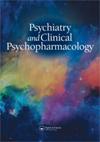阿立哌唑治疗妄想性寄生虫病:8例病例分析
IF 0.5
4区 医学
Q4 PHARMACOLOGY & PHARMACY
引用次数: 4
摘要
【摘要】目的:妄想寄生虫病(Delusional parasitosis, DP),又称Ekbom综合征,是一种罕见的单症状疾病,其特征是在没有任何医学或微生物证据的情况下,坚信自己被寄生虫感染。这些患者在皮肤科和感染诊所接受检查,症状和体征为瘙痒,继发于瘙痒的皮肤和皮下疤痕。当没有发现病因时,诊断为原发性DP,而继发性DP是由潜在的身体或精神障碍引起的。以前,吡莫胺是治疗DP的首选药物。然而,越来越多的证据表明,第二代抗精神病药和抗抑郁药可用于治疗DP。在这项研究中,使用阿立哌唑治疗的DP病例提出。方法:对8例原发性DP患者的人口学资料、临床变量和治疗反应进行评估。精神病学诊断是基于使用DSM-IV轴I障碍(SCID-I)结构化临床访谈进行的临床访谈。这些病人被跟踪了六个月。女性3例,男性5例。患者平均年龄57.5岁。4例合并原发性高血压。症状持续时间为6 ~ 48个月,平均24.75个月。本组8例患者均经皮肤科会诊。对患者进行汉密尔顿抑郁量表(HDS)和简易精神状态检查(MMSE)。8例患者给予阿立哌唑10或15 mg/d治疗,剂量无变化。结果:在阿立哌唑治疗的患者中,7例(87.5%)患者3个月后完全缓解,8例(100%)患者6个月后完全缓解。讨论:DP患者最早的药物选择是吡莫胺,但由于锥体外系副作用和心脏副作用,如QTc延长,第二代抗精神病药物正在研究治疗。关于第二代抗精神病药物如利培酮、奥氮平、帕利哌酮、齐拉西酮、喹硫平、阿立哌唑在DP患者中的应用研究较多。本研究表明,阿立哌唑可以作为DP的一种成功的治疗选择,但该课题还需要进一步的研究。本文章由计算机程序翻译,如有差异,请以英文原文为准。
Aripiprazole as a treatment option for delusional parasitosis: case series of 8 patients
ABSTRACT OBJECTIVE: Delusional parasitosis (DP), also known as Ekbom’s Syndrome, is a rare, generally monosymptomatic disorder that characterizes with the fixed belief of being infected by parasites without any evidence of medical or microbiological proof. These patients are examined in dermatology and infection clinics with symptoms and signs of pruritus, skin and subcutaneous scars secondary to itching. Primary DP is diagnosed when no etiological factor is detected while secondary DP arises from underlying physical or mental disorder. Formerly, pimozide was the commonly preferred choice of treatment with cases of DP. However, there is growing evidence that second-generation antipsychotics and antidepressants can be used in the treatment of DP. In this study, the usage of aripiprazole in the treatment of DP cases is presented. METHODS: 8 patients with the diagnosis of primary DP were evaluated in terms of demographic data, clinical variables and responses to treatment. A psychiatric diagnosis was made based on a clinical interview performed using Structured Clinical Interview for DSM-IV Axis I Disorders (SCID-I) SCID-I. The patients were followed for six months. Three patients were female, five patients were male. The average age of the patients was 57.5. Four patients had essential hypertension as comorbidity. The duration of the symptoms ranged from 6 to 48 months with an average of 24.75 months. All of our 8 cases were consulted by the dermatology department. The patients were performed Hamilton Depression Scale (HDS) and Mini-Mental Status Examination (MMSE). Eight patients were treated with aripiprazole 10 or 15 mg/day, and no dose alteration was made. RESULTS: From the patients who were treated with aripiprazole, seven (87.5%) patients had complete remission after three months, eight (100%) patients achieved complete remission after six months. DISCUSSION: The earliest drug choice for patients with DP was pimozide, but because of the extrapyramidal side effects and cardiac side effects like QTc prolongation, second-generation antipsychotics are being investigated for treatment. Various researches are available related to the usage of second-generation antipsychotics like risperidone, olanzapine, paliperidone, ziprasidone, quetiapine, and aripiprazole in the cases with DP. This study shows that aripiprazole can be a successful treatment choice for DP, but further studies are needed for this topic.
求助全文
通过发布文献求助,成功后即可免费获取论文全文。
去求助
来源期刊

Psychiatry and Clinical Psychopharmacology
Medicine-Psychiatry and Mental Health
CiteScore
1.00
自引率
14.30%
发文量
0
期刊介绍:
Psychiatry and Clinical Psychopharmacology aims to reach a national and international audience and will accept submissions from authors worldwide. It gives high priority to original studies of interest to clinicians and scientists in applied and basic neurosciences and related disciplines. Psychiatry and Clinical Psychopharmacology publishes high quality research targeted to specialists, residents and scientists in psychiatry, psychology, neurology, pharmacology, molecular biology, genetics, physiology, neurochemistry, and related sciences.
 求助内容:
求助内容: 应助结果提醒方式:
应助结果提醒方式:


